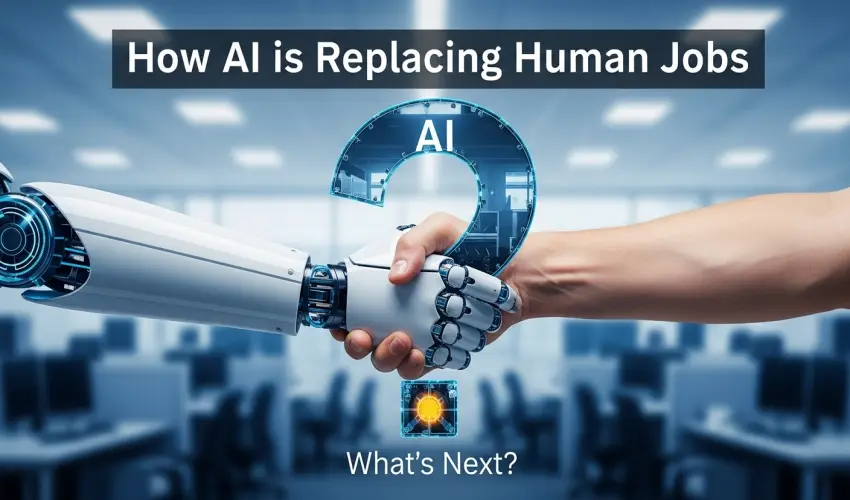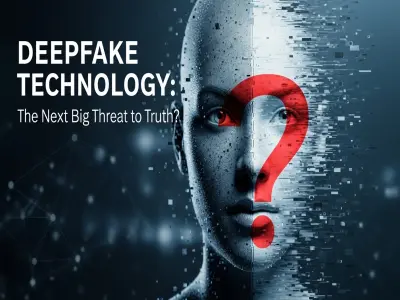How AI is Replacing Human Jobs – What’s Next?
Published Apr 10, 2025
1 0
Key Takeaways
-
AI is rapidly automating tasks across industries like manufacturing, retail, finance, and even creative sectors.
-
Repetitive, manual, and rule-based jobs are the most vulnerable to automation.
-
New AI-driven roles are emerging in fields like AI management, robotics maintenance, and ethical AI governance.
-
Reskilling and upskilling will be crucial for workers to stay relevant in the evolving job market.
-
AI is expected to create more jobs than it displaces in the long term, but only for those who adapt.
-
Governments and organizations must invest in education, innovation, and worker transition programs.
-
Human-centric skills like creativity, emotional intelligence, and critical thinking will become more valuable than ever.
-
The future of work will involve close collaboration between humans and AI, rather than complete human replacement.
Introduction
The rise of Artificial Intelligence (AI) has initiated one of the most significant shifts in human history. Once a concept confined to science fiction, AI now powers our smartphones, drives our cars, and even writes articles. While this technological revolution promises immense benefits, it also brings a pressing challenge: the displacement of human jobs.
How far will AI go in replacing the workforce? What industries are most at risk? And more importantly, what lies ahead for human workers in this new era?
The Current State of AI and Job Displacement
AI has already made significant inroads into several industries, automating tasks that were once exclusively human domains:
-
Manufacturing: Robots and smart factories handle repetitive assembly tasks faster and with fewer errors.
-
Retail: Self-checkout kiosks and automated inventory systems are reducing the need for cashiers and stock clerks.
-
Finance: AI algorithms manage investments, analyze fraud patterns, and provide financial advice.
-
Customer Service: Chatbots now handle millions of customer queries 24/7 without human intervention.
According to a 2023 report by the World Economic Forum, AI could displace over 85 million jobs globally by 2025, but it may also create 97 million new roles for those who are prepared to adapt.
Which Jobs Are Most at Risk?
Certain types of jobs are particularly vulnerable to automation:
-
Repetitive Manual Jobs: This includes assembly line workers, data entry clerks, and warehouse operators.
-
Customer Service and Telemarketing: Automated call centers and chatbots are replacing basic support roles.
-
Transportation: Self-driving trucks and delivery drones are on the horizon, threatening the livelihoods of drivers and couriers.
-
Administrative Work: AI is beginning to automate tasks like scheduling, legal document review, and even basic news writing.
Industries That Will Evolve, Not Disappear
Not all industries are doomed; many will transform rather than collapse, with AI acting as a powerful assistant to human professionals:
-
Healthcare: AI will assist doctors in diagnosing diseases, but the human touch in patient care will remain irreplaceable.
-
Education: AI will personalize learning experiences, allowing teachers to become facilitators and mentors.
-
Creative Fields: AI will generate music, art, and scripts, but human creativity will still be needed to lead innovation and provide vision.
-
Engineering: Designing, supervising, and repairing AI systems will become essential new fields.
New Job Categories Emerging in the AI Era
As AI takes over old roles, it simultaneously creates new ones that didn't exist a decade ago:
-
AI Ethics Specialist: Ensuring AI systems are fair, unbiased, and transparent.
-
Robot Maintenance Technician: Repairing and programming the robotics that power modern industries.
-
Data Curator: Organizing and cleaning the massive datasets required to train AI models.
-
Human-AI Interaction Designer: Creating seamless and intuitive interfaces between machines and people.
The Skills That Will Matter Most
In the age of AI, the future will belong to the adaptable. The most critical skills for survival will be uniquely human:
-
Digital Literacy: Understanding how to work with AI systems, not just use them.
-
Critical Thinking: Analyzing and questioning AI-driven outcomes to ensure accuracy and fairness.
-
Creativity: Imagining and designing new applications and solutions that leverage AI.
-
Emotional Intelligence: Leading teams, managing relationships, and providing empathetic service.
-
Lifelong Learning: Continuously updating your knowledge in a fast-evolving technological landscape.
What Individuals Can Do to Stay Relevant
Instead of fearing the future, individuals must embrace change and take proactive steps:
-
Learn Continuously: Enroll in online courses on AI, data analysis, or cybersecurity.
-
Cultivate Soft Skills: Focus on developing leadership, empathy, and communication abilities.
-
Adopt a Tech-Savvy Mindset: Understand the basics of how AI, blockchain, and other emerging technologies work.
-
Think Entrepreneurially: Consider how you can use AI to create value, rather than seeing it as a competitor.
The key is to shift from competing against AI to collaborating with AI.
The Long-Term Outlook
Despite fears of mass unemployment, history shows that technological revolutions—from the industrial age to the internet boom—eventually create more jobs than they destroy. AI will likely follow the same path, but the transition will require significant societal adaptation.
Jobs of the future will be less about routine labor and more about creativity, strategic thinking, and human connection. AI will become a powerful tool, but humans will provide the purpose, the heart, and the soul.
Conclusion
AI is not just replacing jobs; it's reshaping the very nature of work. The question is not "Will AI take my job?" but rather "How can I evolve with AI?" The answer lies in adaptation, education, and collaboration. Those who stay flexible, commit to lifelong learning, and cultivate their uniquely human skills will not just survive the AI revolution—they will lead it.
The future of work is not humans versus AI. It’s humans with AI, creating a new world together.








